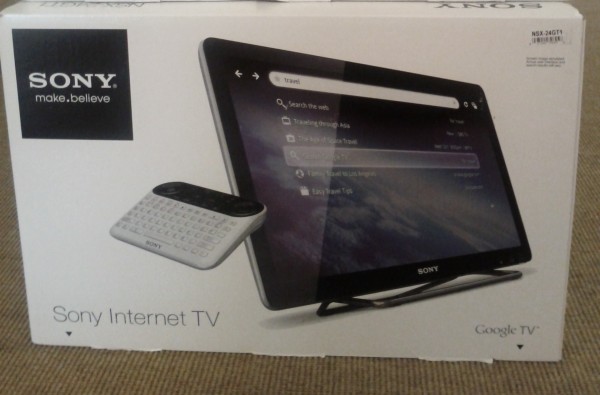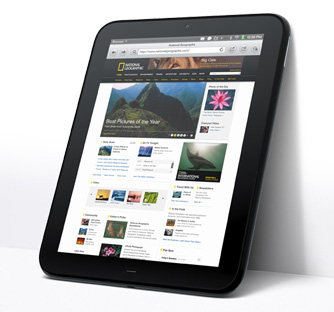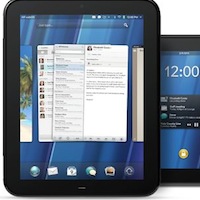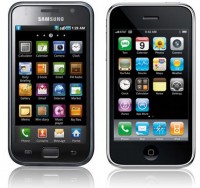
'Google TVs? They're selling really well'
That's the word from an employee at my local Sony Style Store, at Fashion Valley Mall in San Diego. Google TV products should be selling, because Sony has priced them to move as part of a clever back-to-school promotion.
The store prominently displays three "Internet TV" products, which all incorporate Google TV -- Blu-ray player and 24-inch and 32-inch televisions. The marketing pitch is simple: They're perfect for the dorm room. The Blu-ray player, which sold for $399.99 a few months ago, is $199.99. The 24-inch TV is $299.99 and the larger one sells for $499.99. I was so-o-o-o tempted to buy the Google TV Blu-ray player.

'It was like a stampede, and they went quick'
That's how a Best Buy employee described the line waiting to buy discounted HP TouchPads today outside the Mission Valley store in San Diego.
More than 100 people waited for the store to open, on a Sunday morning, to get one of about 30 TouchPads still in stock. They were sold out five minutes after the Best Buy opened.

Best Buy nukes tablet partners, resumes HP TouchPad sales
So much for my heaping praise on Best Buy. The retailer has decided to unload its unsold stock of TouchPads after all. It's an atomic blast that will have grave consequences for Best Buy and, more importantly, its other tablet partners. Apple might just laugh all the way to the bank.
The problem is this: Best Buy is sitting on an inventory of as many as 245,000 TouchPads -- or was yesterday. Today, who knows how many there will be for how long. By midday yesterday, cheap TouchPads were sold out pretty much everywhere, except HP online. Today, Best Buy owns TouchPad sales and already has sold out its online stock. Now it's up to retail stores to clear inventory. Last week, my local Best Buy sold the 16GB TouchPad for $499.99. Today it's $99 -- $149 for the 32GB model -- for an attractive 9.7-inch tablet, running the well-reviewed WebOS.

Sit down, kick off your shoes and cozy up to the new BetaNews
Please pardon the dust, and watch out for falling debris. BetaNews relaunched overnight August 20. The site has moved from a custom content management system to (a very customized) WordPress.
BetaNews founder Nate Mook and his developer team have done a great job getting the new site up and running on WP, which will offer lots more flexibility curating and presenting content and allow for better reader engagement. Expect more changes as we tweak the look and feel. I'm looking forward to lots of (cough, cough) work this creates for me as managing editor. It will be fun.

What does the glut of cheap HP TouchPads mean for Apple and Android tablet sales?
If you're trying to get a $99 TouchPad but can't find it anywhere, blame Best Buy. Based on calls placed to a half-dozen of the stores today, Best Buy has refused to sell its huge stock of HP tablets, choosing to return them to HP instead. It's probably cheaper for HP to dump the TouchPads -- as in a landfill -- then to sell them. You can thank Best Buy, which is sitting on an estimated 245,000 units, for that and partly for the mess at HP's online store today.
But there's sense -- loads of it -- for Best Buy shipping back unsold TouchPads rather than putting the soon-to-be obsolete devices into the hands of greedy geeks. HP, which is spending more than $100 million liquidating tablet stock, will compensate Best Buy for inventory. Better to take that cash rather than collapse sales of other tablets and quite possibly create unrealistic expectations among regular shoppers about what tablets should sell for.

Can HP survive Leo Apotheker?
It has been a rough week for Hewlett Packard, which stock took a beating following Thursday’s announcement that the company was rapidly exiting the hardware business, all but killing off WebOS and its associated line of mobile devices, including TouchPad. Within a day, a fifth of the company’s value disappeared on Wall Street.
How much, you say? A staggering $16.2 billion -- some $4 billion more than Google paid for Motorola Mobility. Analysts seem dismayed, and have downgraded the company’s stock. At least one of the credit rating agencies has threatened a downgrade of HP’s debt, and investors seem to doubt the company’s ability to make the switch.

It's a TouchPad Gold Rush!!
To celebrate the launch of BetaNews' latest redesign, we all went on a Cannonball Run for the newly-discounted HP TouchPad, and we found that it truly was a gold rush, and nearly every TouchPad had been scooped up.
Diehards all over the place hit the shops at 8am EST this morning to try to snatch up the super cheap, high quality WebOS tablets from whichever retailers had them in stock, and as it turns out, they weren't exactly lining their birdcages with the things, as some journalists had initially suggested.

Where's the HP TouchPad fire sale?
The InterWebs buzzed last night with excitement about TouchPads selling for $99 and $149 -- that's for the 16GB and 32GB models, respectively. These prices make Border's bankruptcy liquidation look pathetic. Suddenly, TouchPad is the Lamborghini of tablets for 30 year-old VW bug prices. Yeah, but where do you get such a steal? Not where I expected.
Last night, Amazon and Best Buy still offered TouchPad at full retail prices here in the United States. Best Buy Canada, among a handful of other retailers, offered the discount prices yesterday -- that's $300 and $350 off. Today. The WebOS tablet is gone from both US retail Websites, and that's not because they're sold out. I called three East Coast Best Buys this morning and got the same response from all. If they carried TouchPad, it would still be for the higher prices. HP has recalled the tablet, and Best Buy has none to sell.

HP promises WebOS developers an 'updated strategy'
Friday evening, after retailers began showing $99 liquidation prices for the discontinued HP TouchPad, Hewlett-Packard sent a missive to its registered WebOS developers, vaguely outlining the changes that will take place after the company shutters its WebOS hardware division and considers alternatives for the mobile operating system.
Here's the letter in its entirety:

According to Factiva, you could be your company's 'Information Captain'
When you discover an interesting or important article, do you share it with your co-workers and peers? Or are you more the type to read something one of your colleagues shared, and then dig deeper into it to learn more? You could be a "Connector," or a "Miner," according to a new ethnographic study from Dow Jones Factiva.
The study observed the way different individuals in a company search for information and share it with their co-workers, and Dow Jones used the study's data to create six broad psychological profiles based on different user behaviors.

Apple does it again? Doctors Samsung images in court filing?
Apple may have just found itself in hot water again after a dutch technology news site spotted doctored images within a filing in Netherlands court surrounding Samsung's Galaxy S smartphones. The Cupertino company is accusing Samsung of copying the iPhone's design in its line of smartphones, and is seeking an injunction.
Webwereld.nl found that Apple had allegedly doctored the image of a Galaxy S smartphone by compressing it to make it the same height as the iPhone 3G, which Apple claims Samsung lifted the Galaxy S design from. By doing so, it also made the phone wider, which would further exaggerate the similarities.

Did HP do the wrong thing by killing off TouchPad?
HP is taking a beating for its decision to kill off WebOS devices, including TouchPad, and shopping around its PC division, which could be spun off or sold. Shares fell nearly 23 percent -- that's about a six-year low! -- in early trading today.
Betanews readers, who are an opinionated lot, are figuratively shaking their heads in dismay, too.

AT&T executive appears to confirm October iPhone 5 release
AT&T executives are apparently talking up an October release of the iPhone 5, confirming earlier talk that the launch of the next generation phone from Apple would come later than many had initially expected.
AllThingsD was one of the first news outlets to report on an October launch date. No reasoning was given, but it indicated that reports of a two week blackout for employee vacations in late September was not related to the iPhone 5 launch.

Sony unveils 3D HD video binoculars for long-distance lurkers
Sony today debuted two new sets of video binoculars, the DEV-3 and DEV-5, which are capable of 2D and 3D image capture using the new AVCHD 2.0 format.
Though images captured in the original AVCHD standard have shown a slight lack of clarity when compared to HDV because of its 13 to 17 mbps MPEG4-AVC compression in real-world trials; the AVCHD 2.0 standard, which debuted earlier this year, bumps up the maximum system bitrate to 28 Mbps, adds the capacity for 1080p 50i, 1080p 60i, and 3D image capture.

Which Firefox is right for you -- 6, 7, 8 or 9?
The browser market moves at a hectic pace these days, and so while a month ago most people were happily using Firefox 5, Mozilla has released Firefox 6, Firefox 7 beta, Firefox 8 Aurora, and even Firefox 9 via the Nightly channel.
Perhaps unsurprisingly, most of the changes are internal and will make little immediate difference to most people. We ran a few benchmarks on the various builds, for instance, and found Firefox 9 had around a 4 percent lead over Firefox 6, but otherwise the performance of Firefox 7, 8 and 9 proved very similar.



